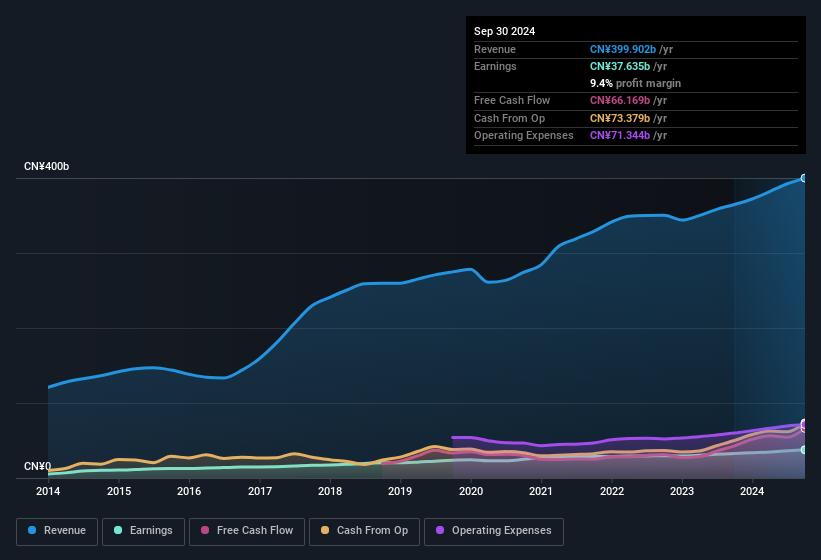- China
- /
- Consumer Durables
- /
- SZSE:000333
Statutory Profit Doesn't Reflect How Good Midea Group's (SZSE:000333) Earnings Are
Midea Group Co., Ltd. (SZSE:000333) just reported healthy earnings but the stock price didn't move much. Our analysis suggests that investors might be missing some promising details.
Check out our latest analysis for Midea Group

Zooming In On Midea Group's Earnings
Many investors haven't heard of the accrual ratio from cashflow, but it is actually a useful measure of how well a company's profit is backed up by free cash flow (FCF) during a given period. The accrual ratio subtracts the FCF from the profit for a given period, and divides the result by the average operating assets of the company over that time. This ratio tells us how much of a company's profit is not backed by free cashflow.
That means a negative accrual ratio is a good thing, because it shows that the company is bringing in more free cash flow than its profit would suggest. That is not intended to imply we should worry about a positive accrual ratio, but it's worth noting where the accrual ratio is rather high. That's because some academic studies have suggested that high accruals ratios tend to lead to lower profit or less profit growth.
Over the twelve months to September 2024, Midea Group recorded an accrual ratio of -0.19. That indicates that its free cash flow quite significantly exceeded its statutory profit. In fact, it had free cash flow of CN¥66b in the last year, which was a lot more than its statutory profit of CN¥37.6b. Midea Group shareholders are no doubt pleased that free cash flow improved over the last twelve months. Unfortunately for shareholders, the company has also been issuing new shares, diluting their share of future earnings.
That might leave you wondering what analysts are forecasting in terms of future profitability. Luckily, you can click here to see an interactive graph depicting future profitability, based on their estimates.
One essential aspect of assessing earnings quality is to look at how much a company is diluting shareholders. Midea Group expanded the number of shares on issue by 10% over the last year. That means its earnings are split among a greater number of shares. Per share metrics like EPS help us understand how much actual shareholders are benefitting from the company's profits, while the net income level gives us a better view of the company's absolute size. You can see a chart of Midea Group's EPS by clicking here.
How Is Dilution Impacting Midea Group's Earnings Per Share (EPS)?
Midea Group has improved its profit over the last three years, with an annualized gain of 32% in that time. And in the last year the company managed to bump profit up by 15%. But in comparison, EPS only increased by 13% over the same period. Therefore, the dilution is having a noteworthy influence on shareholder returns.
Changes in the share price do tend to reflect changes in earnings per share, in the long run. So it will certainly be a positive for shareholders if Midea Group can grow EPS persistently. However, if its profit increases while its earnings per share stay flat (or even fall) then shareholders might not see much benefit. For the ordinary retail shareholder, EPS is a great measure to check your hypothetical "share" of the company's profit.
Our Take On Midea Group's Profit Performance
In conclusion, Midea Group has strong cashflow relative to earnings, which indicates good quality earnings, but the dilution means its earnings per share growth is weaker than its profit growth. Considering all the aforementioned, we'd venture that Midea Group's profit result is a pretty good guide to its true profitability, albeit a bit on the conservative side. If you'd like to know more about Midea Group as a business, it's important to be aware of any risks it's facing. For example, we've discovered 1 warning sign that you should run your eye over to get a better picture of Midea Group.
Our examination of Midea Group has focussed on certain factors that can make its earnings look better than they are. But there are plenty of other ways to inform your opinion of a company. For example, many people consider a high return on equity as an indication of favorable business economics, while others like to 'follow the money' and search out stocks that insiders are buying. So you may wish to see this free collection of companies boasting high return on equity, or this list of stocks with high insider ownership.
New: Manage All Your Stock Portfolios in One Place
We've created the ultimate portfolio companion for stock investors, and it's free.
• Connect an unlimited number of Portfolios and see your total in one currency
• Be alerted to new Warning Signs or Risks via email or mobile
• Track the Fair Value of your stocks
Have feedback on this article? Concerned about the content? Get in touch with us directly. Alternatively, email editorial-team (at) simplywallst.com.
This article by Simply Wall St is general in nature. We provide commentary based on historical data and analyst forecasts only using an unbiased methodology and our articles are not intended to be financial advice. It does not constitute a recommendation to buy or sell any stock, and does not take account of your objectives, or your financial situation. We aim to bring you long-term focused analysis driven by fundamental data. Note that our analysis may not factor in the latest price-sensitive company announcements or qualitative material. Simply Wall St has no position in any stocks mentioned.
About SZSE:000333
Midea Group
Manufactures and sells home appliances, and robotic and automation systems in China and internationally.
Very undervalued with flawless balance sheet and pays a dividend.
Market Insights
Community Narratives



